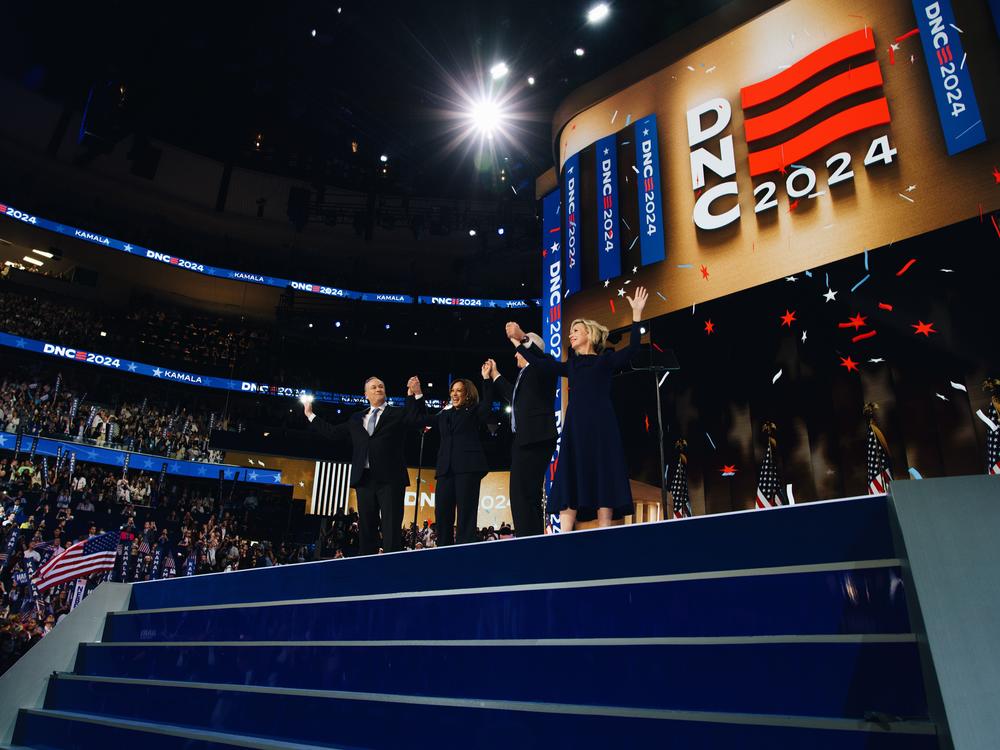Section Branding
Header Content
Harris prosecutes case against Trump and pitches herself as a middle-class champion
Primary Content
Kamala Harris used her first major address as the Democratic nominee for president to combine a personal recounting of her middle-class roots with a sharp prosecution of the case against electing Donald Trump to another term.
She called Trump an "unserious man" but said the consequences of putting him back in the White House would have "serious consequences."
Harris took the stage after three days of an enthusiastic Democratic convention. The political environment dramatically transformed in a matter of a few weeks after President Biden’s dismal debate performance on June 28.
Just last month Democrats were distraught and resigned to losing the White House in the fall, and potentially losing both the Senate and any prospects to retake control of the House of Representatives. But Biden dropped out of the race and endorsed Harris, and the 2024 race for the White House was completely upended.
The vice president, donning a dark pantsuit on stage at Chicago's United Center, addressed a convention hall with many delegates donning white attire — the color of the women's suffragette movement. The convention hall was at capacity, with security officials restricting access to some levels of the hall hours before Harris' speech. Delegates drowned out the music with loud cheers and a prolonged standing ovation as she took the stage.
Harris outlined forward looking agenda, warned about Trump's second term
Harris served as Biden's vice president for the last three and half years, but during her speech Thursday night she sidestepped links to the incumbent administration, instead pitching herself as a change agent.
She briefly thanked Biden and maintained history would regard his record as "extraordinary."
Her address — which lasted roughly 40 minutes — quickly pivoted to establish her own brand, saying, "with this election, our nation has a precious, fleeting opportunity to move past the bitterness, cynicism, and divisive battles of the past. A chance to chart a new way forward — not as members of any one party or faction, but as Americans."
The vice president outlined a series of policy priorities like middle class tax cuts, and an "opportunity economy," but gave few specific details. She pledged to revive the bipartisan border security bill crafted by congressional leaders that Trump urged GOP lawmakers to block.
Watch the full speech here:
(Video credit: AP)
The vice president spent a good deal of her speech warning that Americans' basic freedoms were at risk if Trump returned to office. She referenced the violent attack on the Capitol on Jan. 6, 2021.
“Consider his explicit intent to set free violent extremists who assaulted those law enforcement officers at the Capitol, his explicit intent to jail journalists, political opponents and anyone he sees as the enemy, his explicit intent to deploy our active duty military against our own citizens," she said.
And she pointed to a recent Supreme Court decision that upheld Trump had immunity: "Just imagine Donald Trump with no guardrails. How he would use the immense powers of the presidency of the United States. Not to improve your life. Not to strengthen our national security. But to serve the only client he has ever had: himself."
She also argued that Trump would cut Medicare and Social Security, eliminate the Department of Education, repeal the Affordable Care Act. But she gave special emphasis to Trump's impact on reproductive rights, pointing out that he "bragged" about appointing the Supreme Court justices who overturned Roe v. Wade and that he would pass a nationwide abortion ban, restrict access to birth control, ban medication abortion, and said about his party's plans: "Simply put, they are out of their minds.”
Harris, like other speakers throughout the four-day convention, held up Project 2025, a detailed policy blueprint drafted by the Heritage Foundation, as the playbook for a second Trump administration. Trump has said he had nothing to do with the document, but many of his top administration officials crafted it.
Harris also marked contrast with Trump on foreign policy
A big task for Harris was to demonstrate she could take on the role of commander in chief. Thursday's lineup featured a string of speakers with military or intelligence backgrounds, like former Secretary of Defense Leon Panetta and Arizona Sen. Mark Kelly, acting as validators.
For her part Harris sharply poked at what se described as Trump's allegiances to foreign adversaries, and cast herself as a defender of democracy.
“I will not cozy up to tyrants and dictators like Kim Jong Un who are rooting for Trump."
“They know he is easy to manipulate with flattery and favors. They know Trump won't hold autocrats accountable because he wants to be an autocrat himself.”
She vowed to "never waver in defense of America’s security and ideals. Because, in the enduring struggle between democracy and tyranny, I know where I stand — and where the United States of America belongs."
Harris worked to bridge the divide inside her own party on the Israel-Gaza war.
"Let me be clear, I will always stand up for Israel's right to defend itself and I will always ensure Israel has the ability to defend itself," Harris declared. She said that Israelis should "never again" go through the horror and "unspeakable" attacks on Oct. 7.
And then she added, "at the same time what has happened in Gaza in the past 10 months is devastating. So many innocent lives lost. The scale of suffering is heartbreaking."
She said she and Biden were working for a peace deal that would bring all the hostages home so that "Palestinian people can realize their right to dignity, security, freedom and self determination."
Harris uses convention to introduce herself and tout middle-class roots
Harris’ paid tribute to her mother Shyamala Goplalan, who emigrated from India to California when she was 19, and recounted growing up in working-class neighborhood in the East Bay.
She repeated what has become a familiar line from her stump speeches from her mother — saying when she complained about something she would reply "do something about it," and then added her mother would add, "and never do anything half-assed — and that is a direct quote."
Harris' background as a prosecutor in San Francisco and as attorney general in California have been her regular focus on the campaign trail, and Thursday night she stressed her record representing victims of sexual assault and homeowners facing foreclosure.
"I've only have one client: the people," Harris said.
Trump took to his social media channel to respond to Harris' primetime speech, at one point asking, "Is she talking about me?"
Former Republican Rep. Adam Kinzinger, who had been a member of the House Jan. 6 committee and is a vocal critic of Trump's, also appeared in primetime to argue democracy was at risk if the former president returned. He said "I never thought I'd be here," but he said to fellow Republicans "the Democrats are as patriotic as us. They love this country just as much as we do."
Loading...
Bottom Content




